As the demand for high-resolution content continues to rise, so does the need for efficient and reliable data storage solutions. With the increasing size of files from mobile photography and other digital media, creators often find themselves juggling storage and transfer tasks. Traditional USB flash drives, while portable, are limited in speed, typically reaching only 100–300MB/s. For those seeking faster performance, external SSDs utilizing USB 3.1 can provide speeds of up to 1000MB/s. However, for the next level of speed and convenience, devices compatible with the USB 3.2 Gen2x2 specification are essential.
TEAMGROUP’s T-FORCE M200 Portable SSD stands out as a solution tailored to these advanced requirements. Featuring the latest USB 3.2 Gen2x2 (20Gbps) Type-C interface, this device delivers impressive read and write speeds of up to 2,000MB/s, quadrupling the performance of conventional USB 3.2 Gen1 SSDs. With support for USB Type-A and Type-C OTG functions, it offers broad compatibility across tablets, smartphones, gaming consoles like PlayStation and Xbox, and other devices. Despite its powerful capabilities, the M200 is compact and lightweight at just 83 grams, boasting a generous storage capacity of up to 8TB.
The T-FORCE M200 also excels in durability and design. It incorporates TEAMGROUP’s patented graphene dual-structure technology, which ensures efficient heat dissipation during high-speed operations. This innovation not only maintains optimal performance but also adds to the device’s reliability. Its military-inspired design adds a rugged aesthetic, and with features like a two-meter drop resistance, the M200 strikes a balance between functionality and durability, making it an appealing choice for creators and professionals alike. Let’s take a look at the performance of TEAMGROUP T-FORCE M200 Portable SSD.
Unboxing
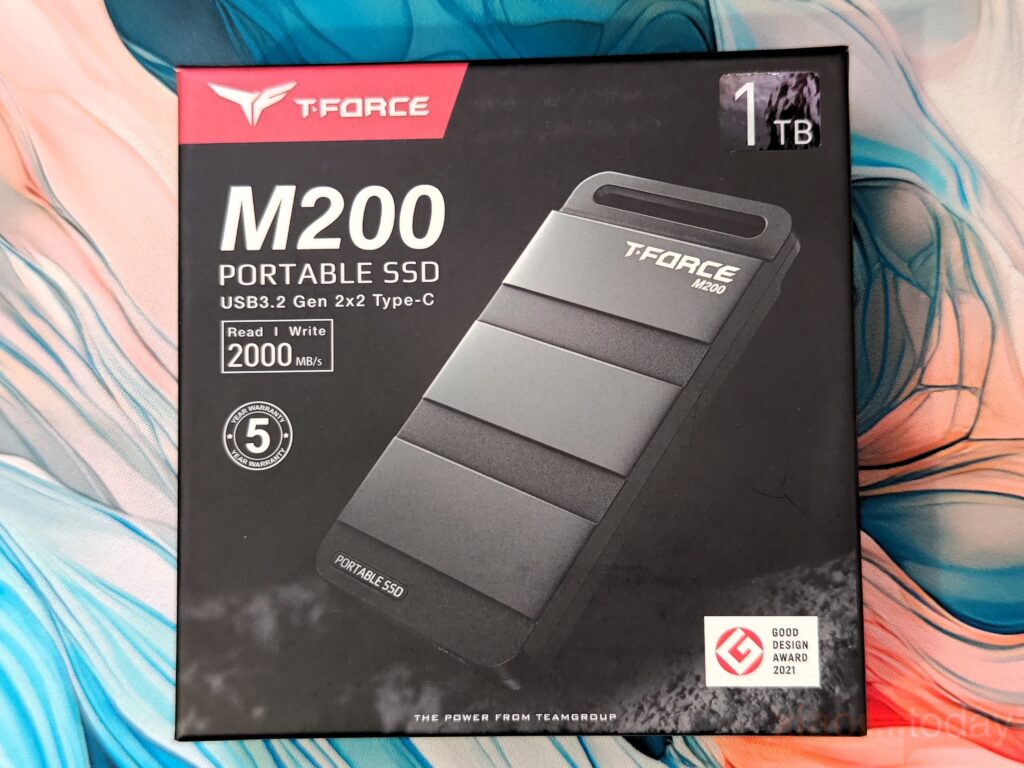
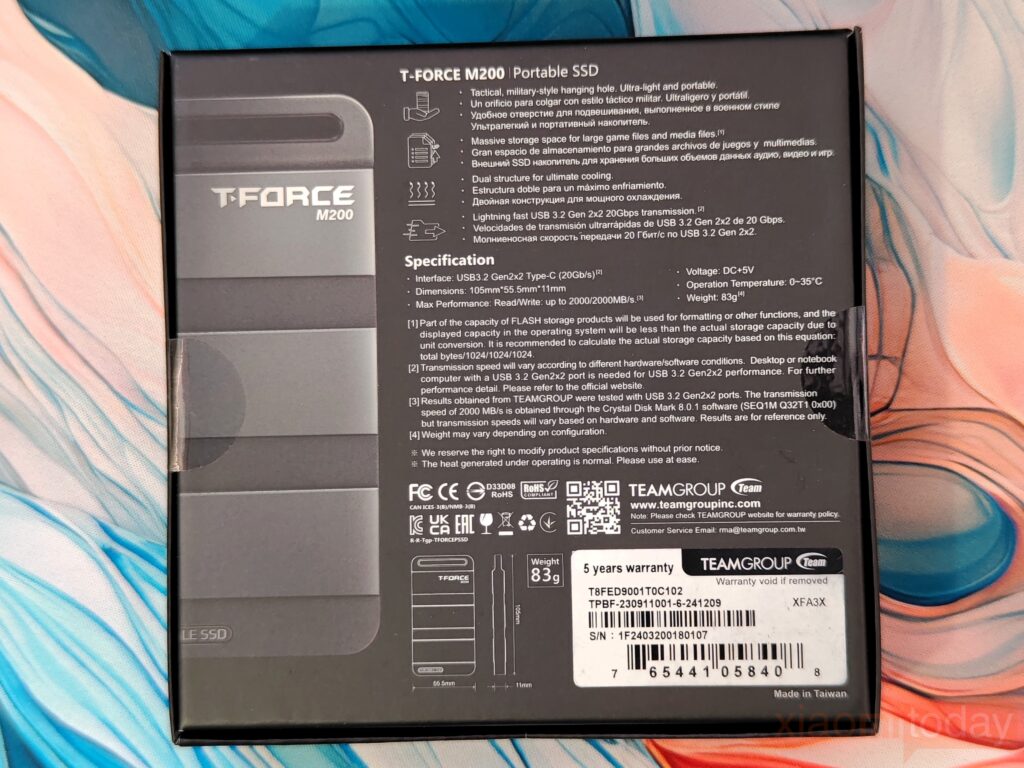
The packaging of the T-FORCE M200 follows a military-style design. The front of the box is predominantly black, giving it a sleek and solid appearance. The upper right corner displays the storage capacity, while the left side highlights the product name along with the read and write speed of 2000MB/s. On the back, the box provides detailed specifications such as power supply requirements, operating temperature range, weight, and dimensions.
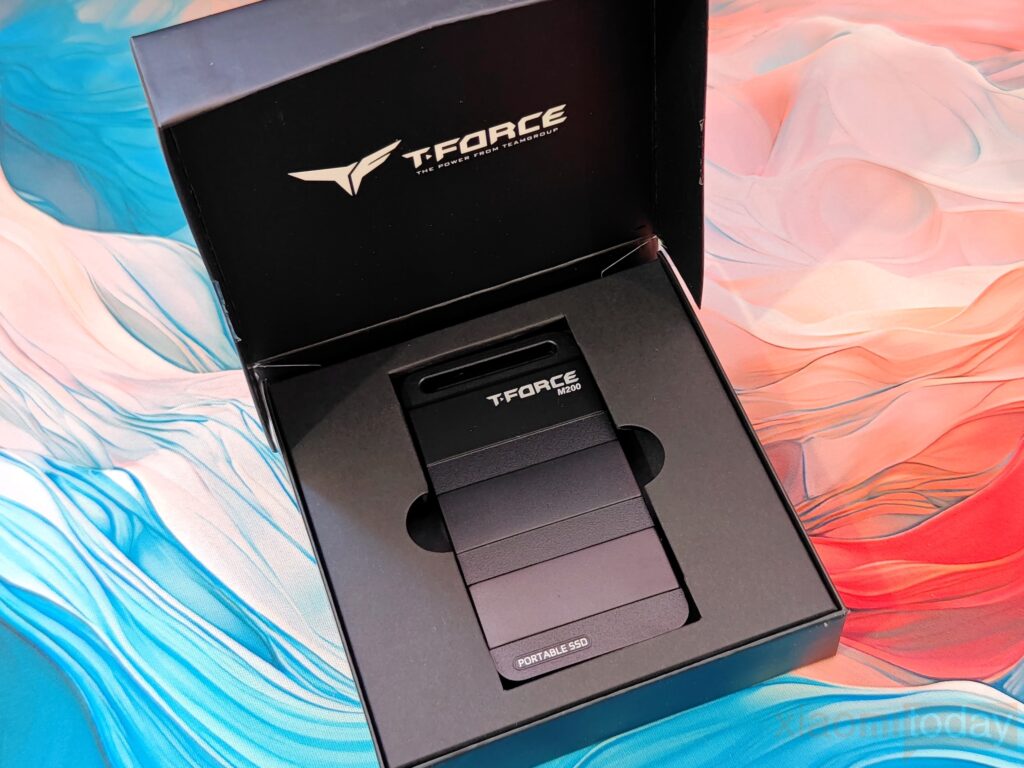
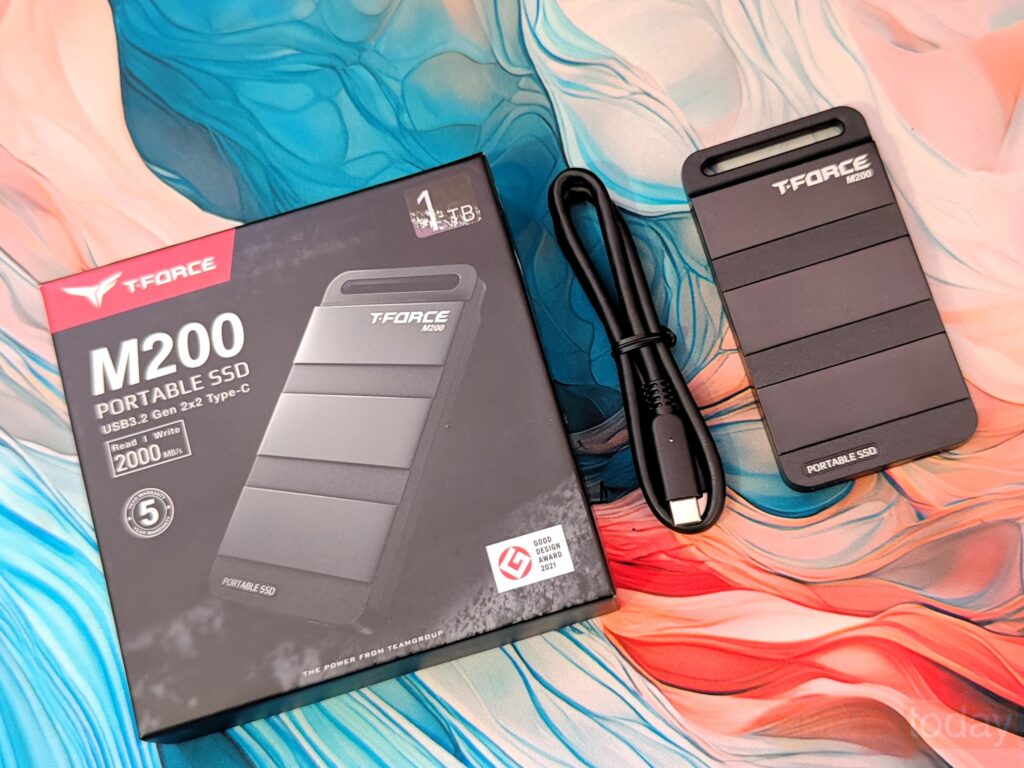
When opening the box, you’ll find a thoughtful and eco-conscious paper tray securing the contents. Inside, along with the M200 Portable SSD, there is a USB Type-C to USB Type-C cable included for data transmission. It’s important to mention that only a USB-C to USB-C connection can fully utilize the maximum data transfer speed of 2000MB/s, provided you have a USB 3.2 Gen 2×2 port available.
Design

The T-FORCE M200 portable SSD immediately catches attention with its distinct design, inspired by sniper rifles. This influence is apparent in its streamlined form and rugged build, which exude a military-inspired aesthetic. The matte black finish enhances its understated yet bold character, while the textured surface ensures a secure grip, even during extended use. Unlike conventional external SSDs that prioritize simplicity, the M200 combines functionality with a design language that appeals to users seeking something both durable and visually striking. Its unique shape and attention to detail make it a compelling option for those who value both performance and style in their portable storage solutions.
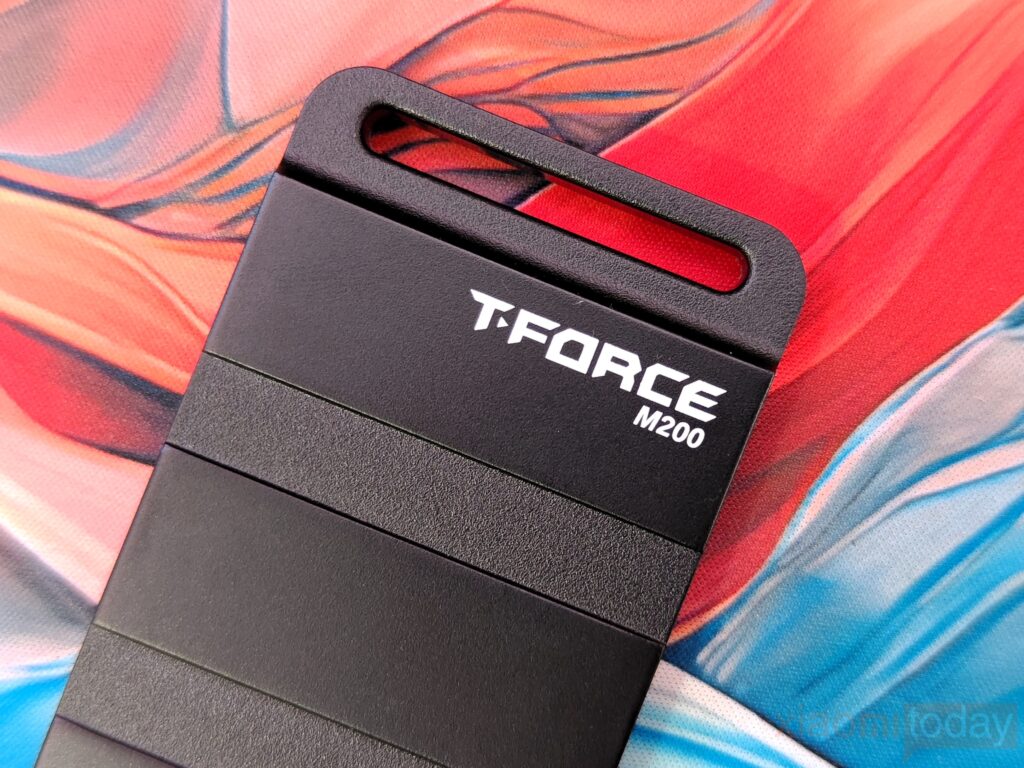
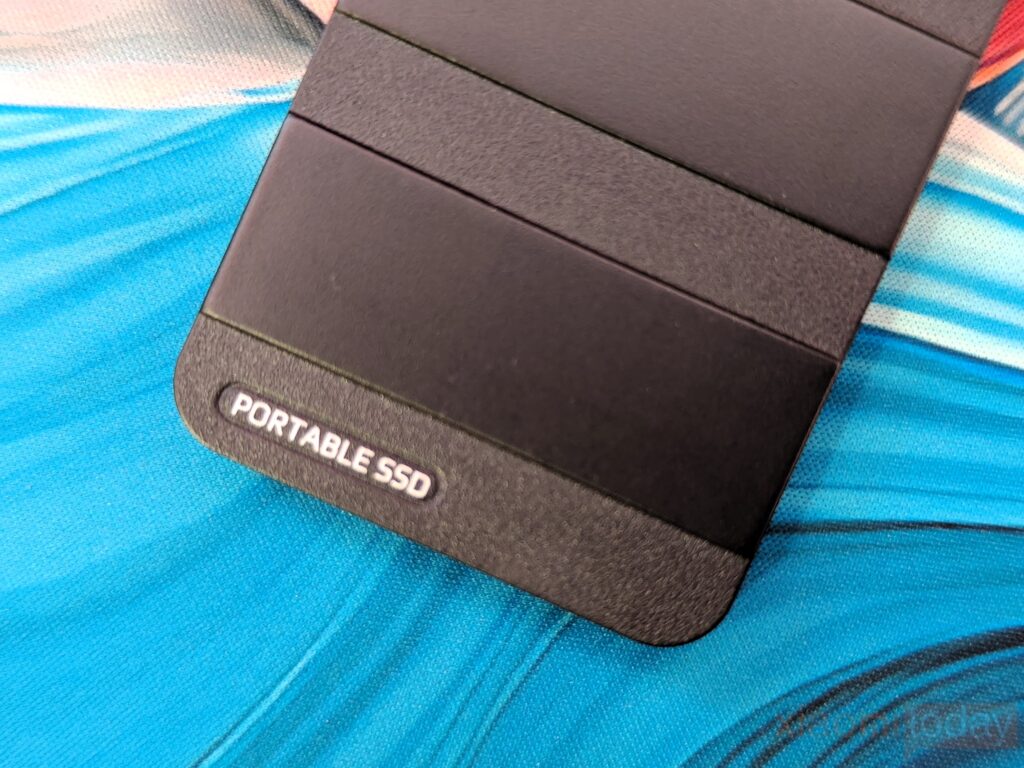
The top of the device features the text “T-FORCE M200,” along with a set of tactical hanging holes integrated into the design. These allow for the attachment of slings or straps, enabling the device to be conveniently hung on a bag for easy portability. Just below, the words “Portable SSD” are clearly printed, reinforcing its intended use.

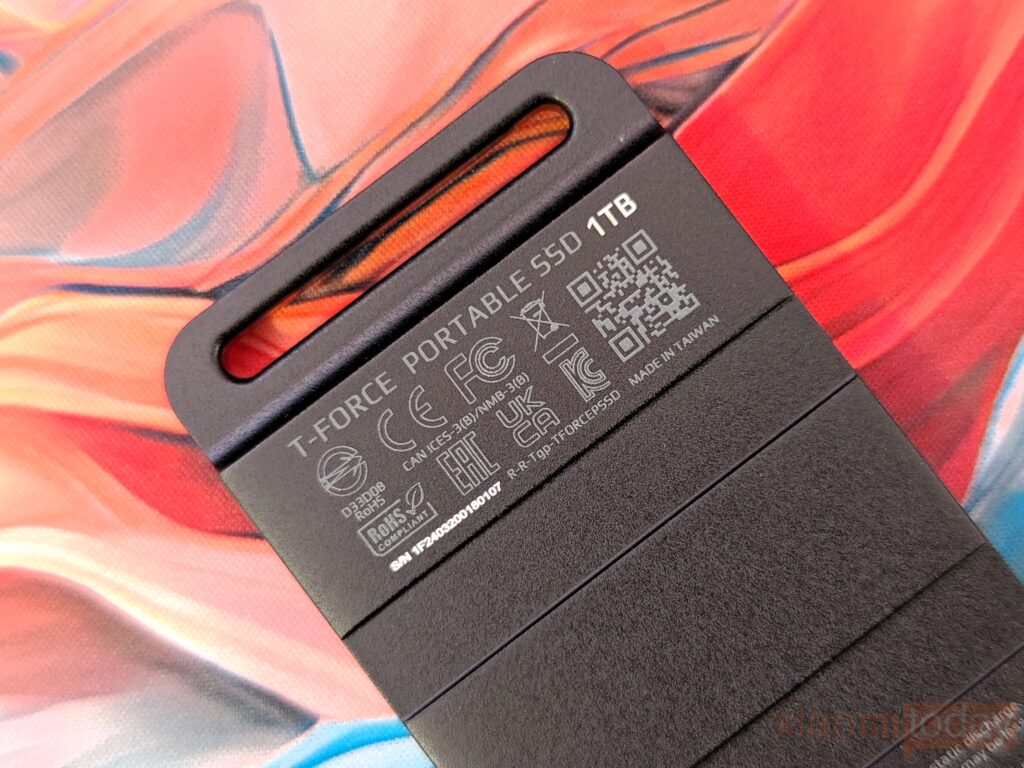
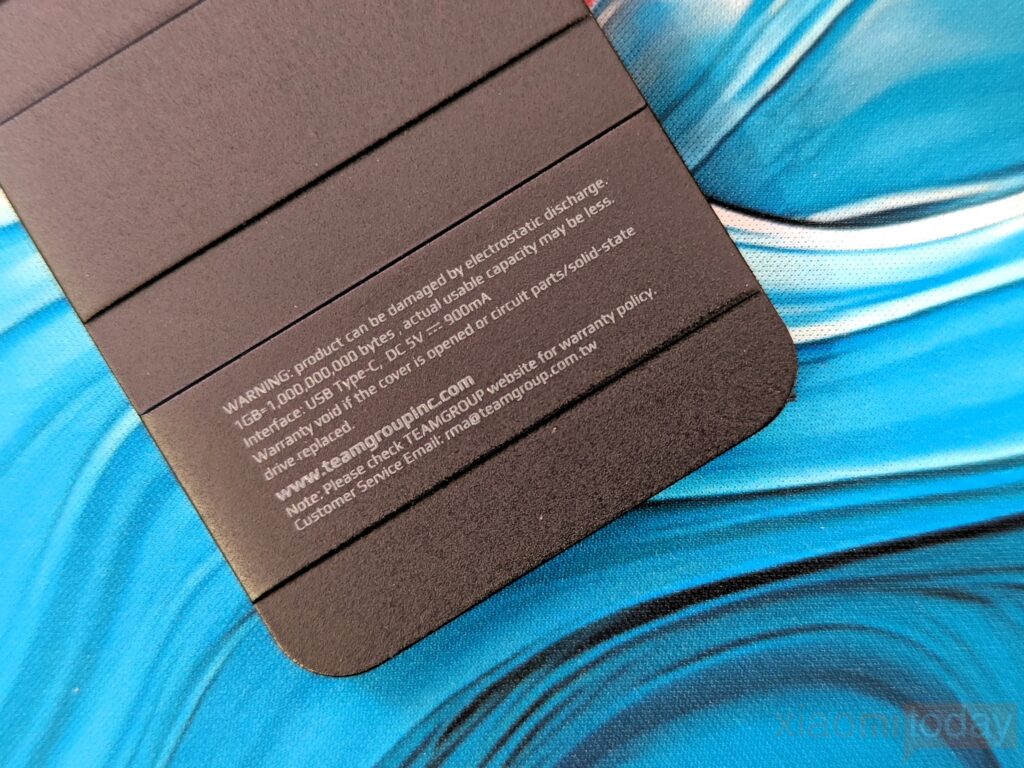
The back of the product provides important safety details, warnings, a list of features, basic specifications, and dimensions. The capacity is clearly indicated, and the product proudly displays its origin as being manufactured in Taiwan.
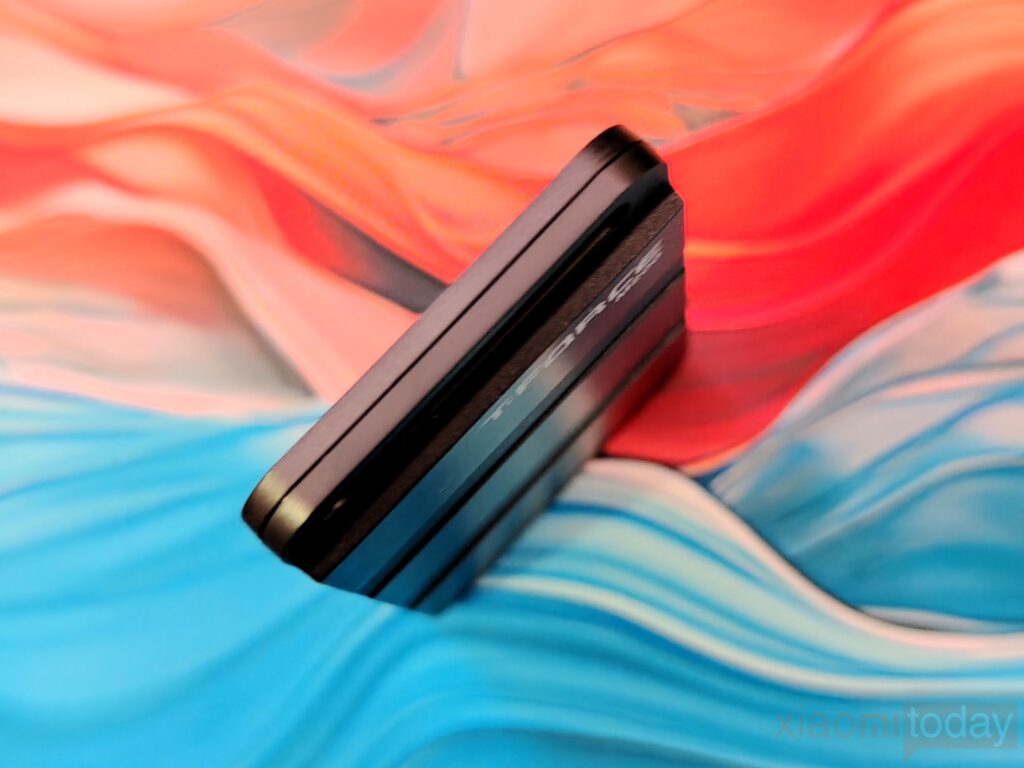
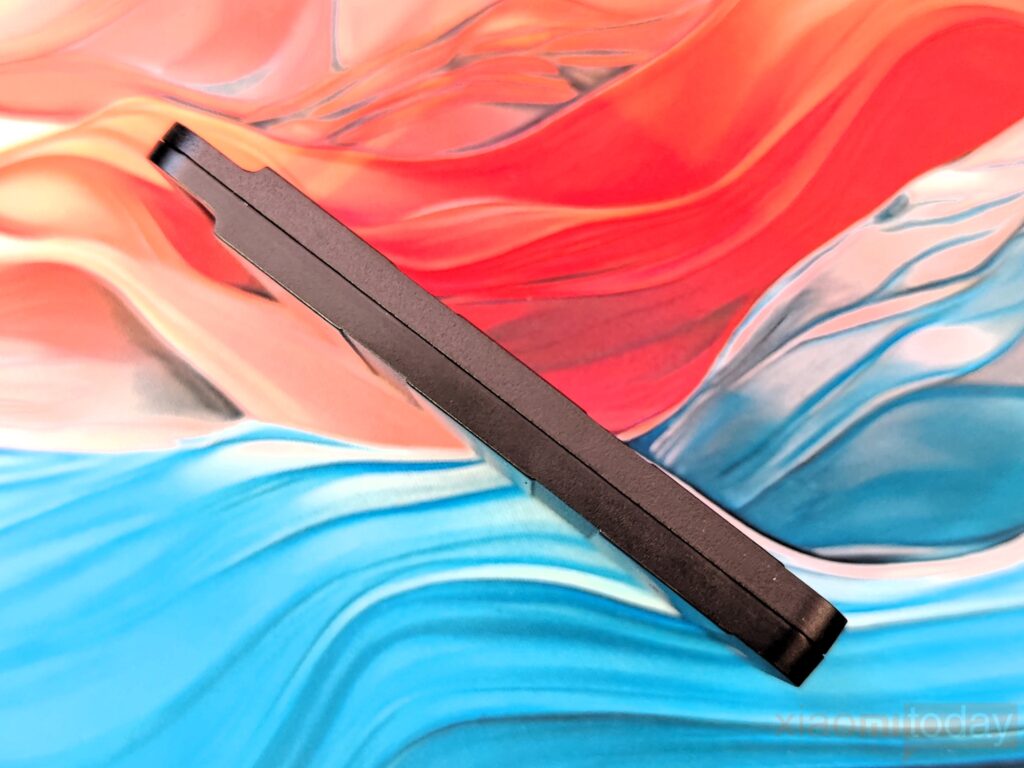
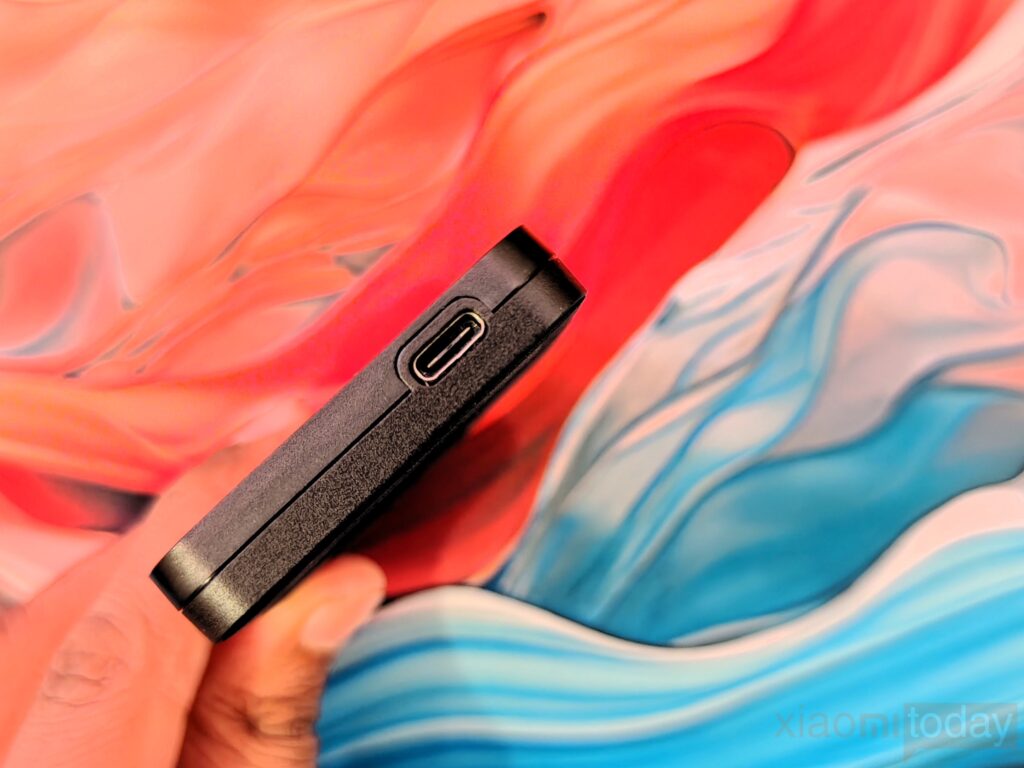
The design of the product is sleek, with no visible screws, contributing to a clean and streamlined appearance. The USB-C port is positioned at the bottom, providing easy access for connectivity. While it is technically possible to open the device, it’s not recommended, as doing so could risk damaging the internal components.

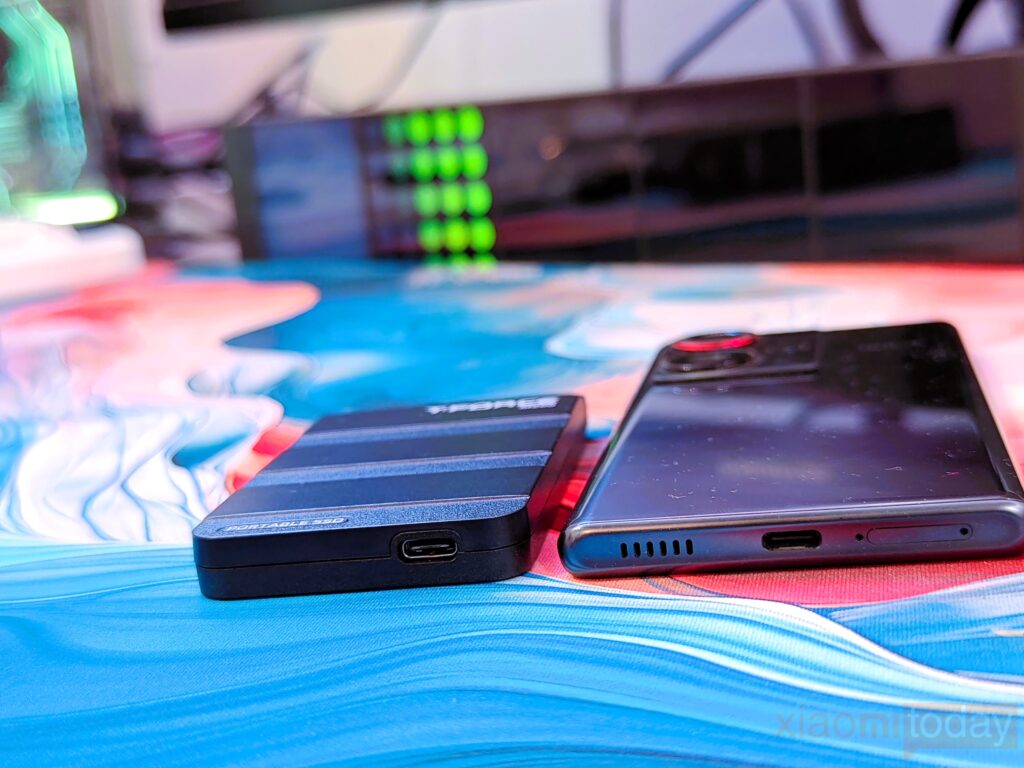
When comparing the T-Force M200 with the Nubia Z50 smartphone, the size difference is noticeable, as the M200 is more compact. However, the T-Force M200 is slightly thicker than the Nubia Z50, offering a more substantial build despite its smaller overall size.
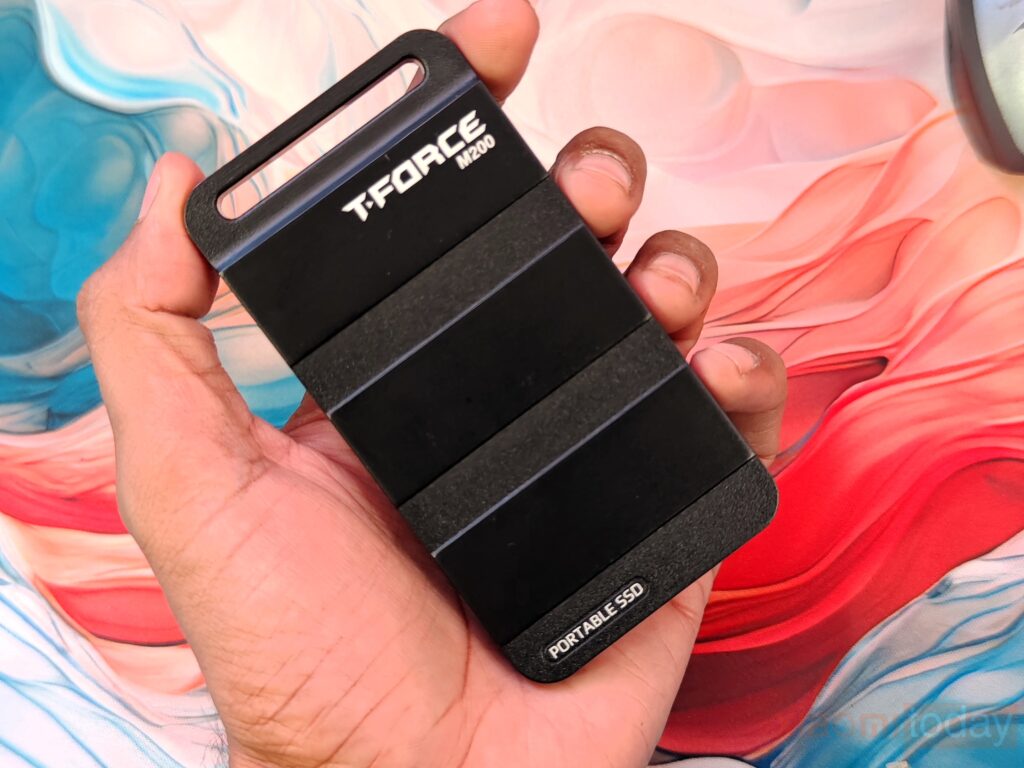
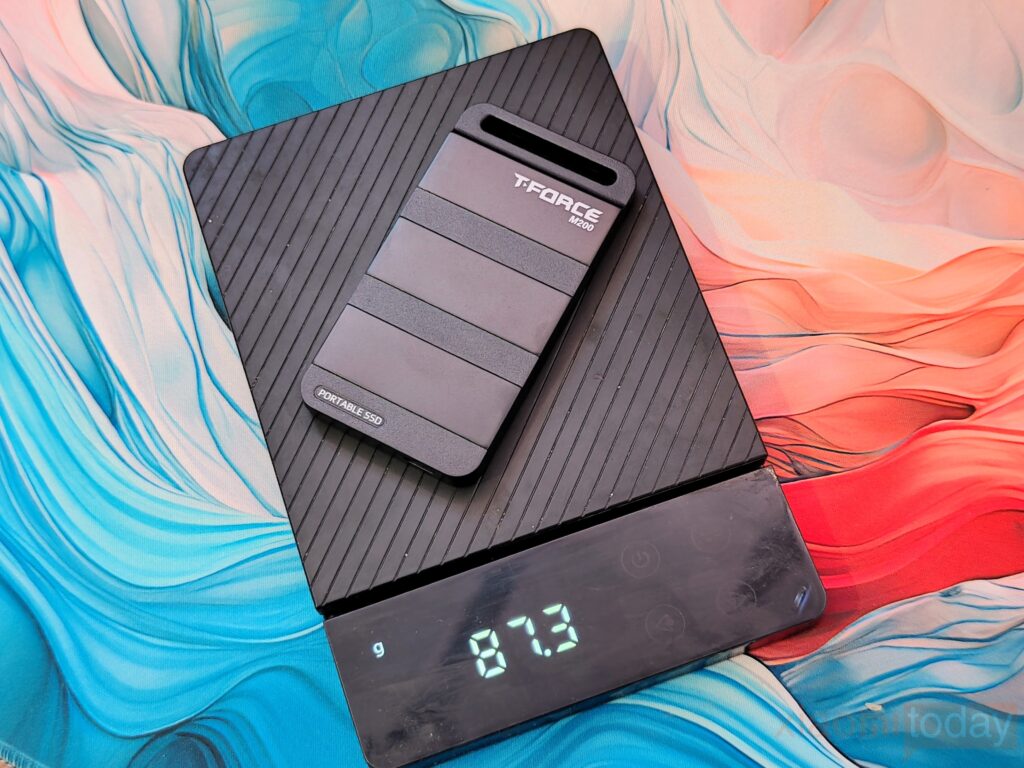
The M200 is compact and comfortable to hold with one hand. Its durable metal body offers both drop resistance and efficient heat dissipation. Measuring just 105mm in length, 55.5mm in width, and 11mm in height, the external hard drive is lightweight, weighing only 87.3 grams, making it easy to carry and use on the go.
In addition, The T-FORCE M200 Portable SSD is built to offer both durability and high performance in a compact form. Its graphene heat sinks play a key role in enhancing the heat dissipation process, effectively keeping the internal components cool during intensive use. This helps maintain consistent speeds and reliability. In terms of durability, the M200 is engineered to withstand tough conditions, having passed a 2-meter drop test, which makes it an ideal option for users who need a portable storage solution that can endure accidental drops and rough handling. Its small size doesn’t compromise its toughness, ensuring it’s both easy to transport and resilient in everyday use.
Performance Test
For testing sequential and random read/write speeds, we employed benchmark tools. The test system consisted of an Intel® Core™ i7-13700K processor and an MSI MPG Z790 CARBON WIFI II DDR5 motherboard, with the USB 3.2 Gen 2×2 interface used for connectivity. However, the T-FORCE M200 Portable SSD does not include a status light for read and write operations, which can make it difficult to determine whether the device is in a writing state. This is something users should be mindful of when using the SSD.
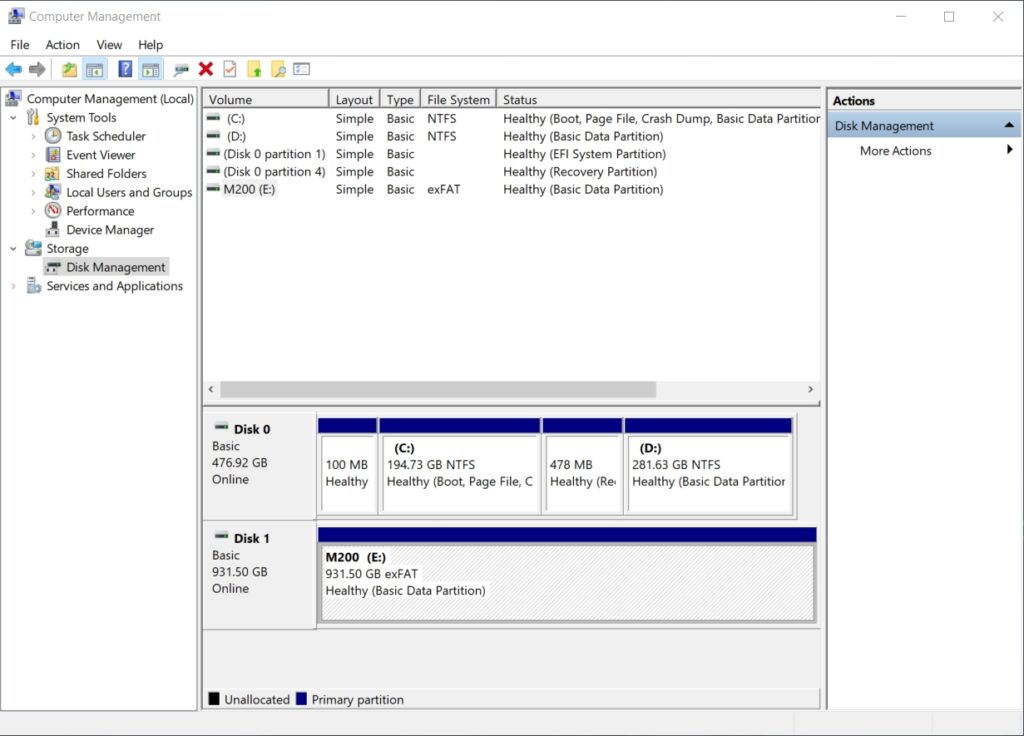
To begin, we can examine the details in Windows Disk Manager. After connecting the T-FORCE M200 to the computer, we can see that the actual available storage is 931 GB, despite the drive being labeled with a 1TB specification. The file system is formatted as exFAT.
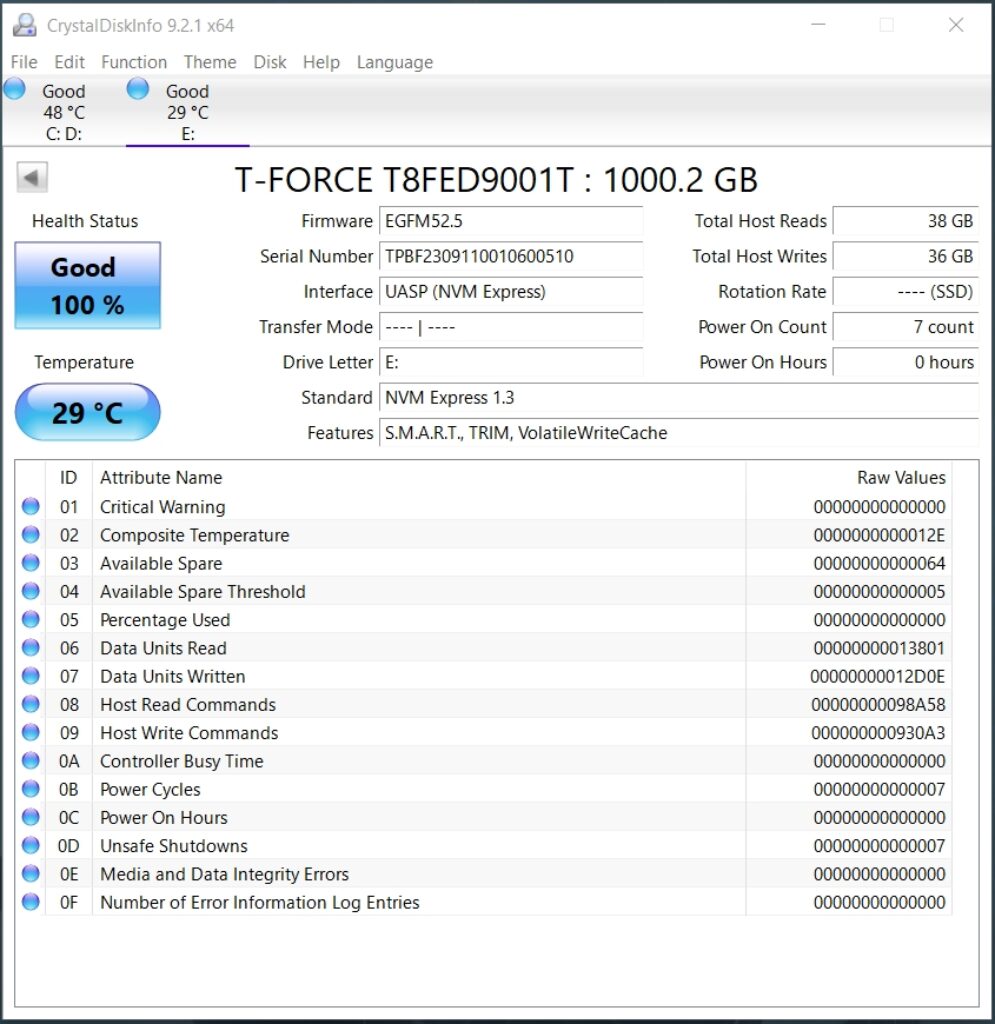
To check the SSD specifications, open CrystalDiskInfo. There, you’ll see that the M200 is listed as the T-FORCE T8FED9001T. It supports essential SMART diagnostics and Windows TRIM for efficient data management. The design includes a VolatileWriteCache to protect against data loss due to sudden connection interruptions during write operations. The drive uses the NVMe 1.3 interface, which is compatible with USAP (USB Attached SCSI Protocol) for optimized data transfer performance.
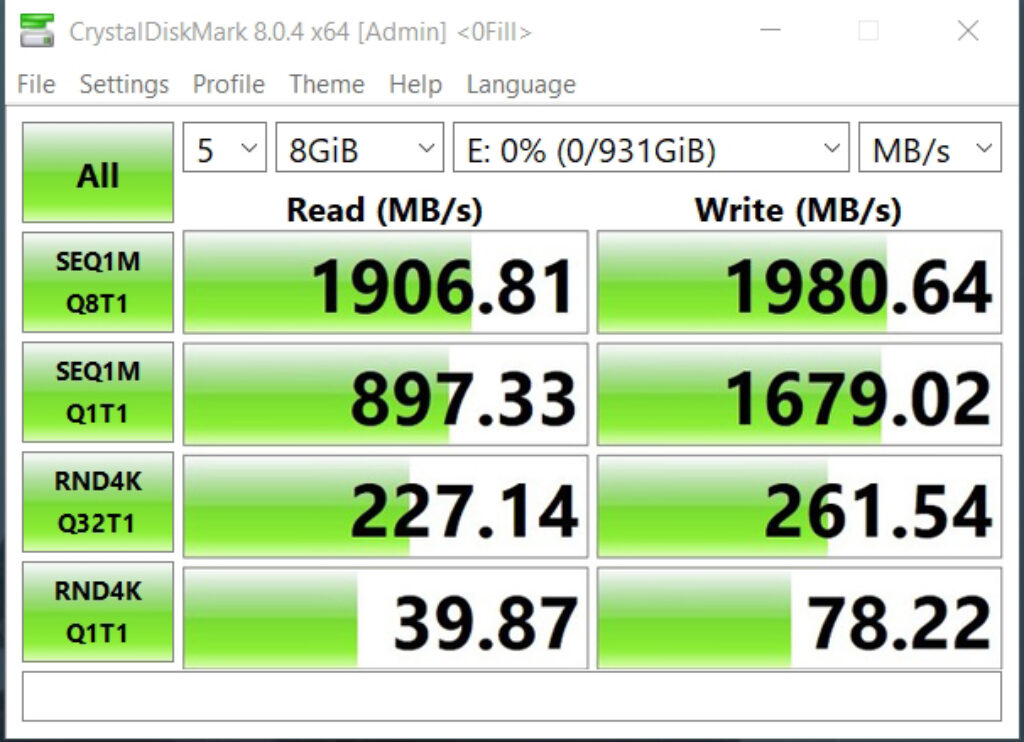
In performance testing with CrystalDiskMark, the T-FORCE M200 Portable SSD showed impressive results. It achieved a sequential read speed of 1906.81 MB/s and a sequential write speed of 1980.64 MB/s. In the 4K small block random write depth 1 test, the read speed was 39.87 MB/s, while the write speed reached 78.22 MB/s. These numbers closely align with the specifications provided by TeamGroup, demonstrating the SSD’s solid performance across both sequential and random read/write operations.
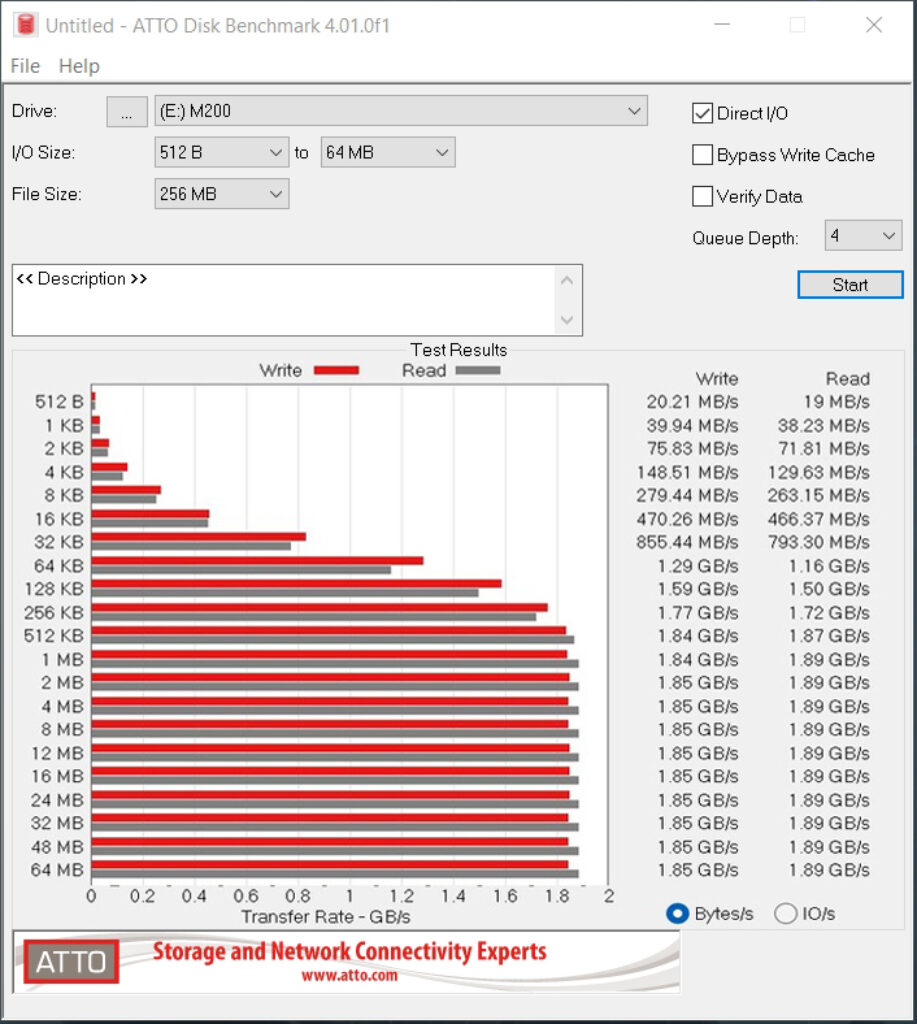
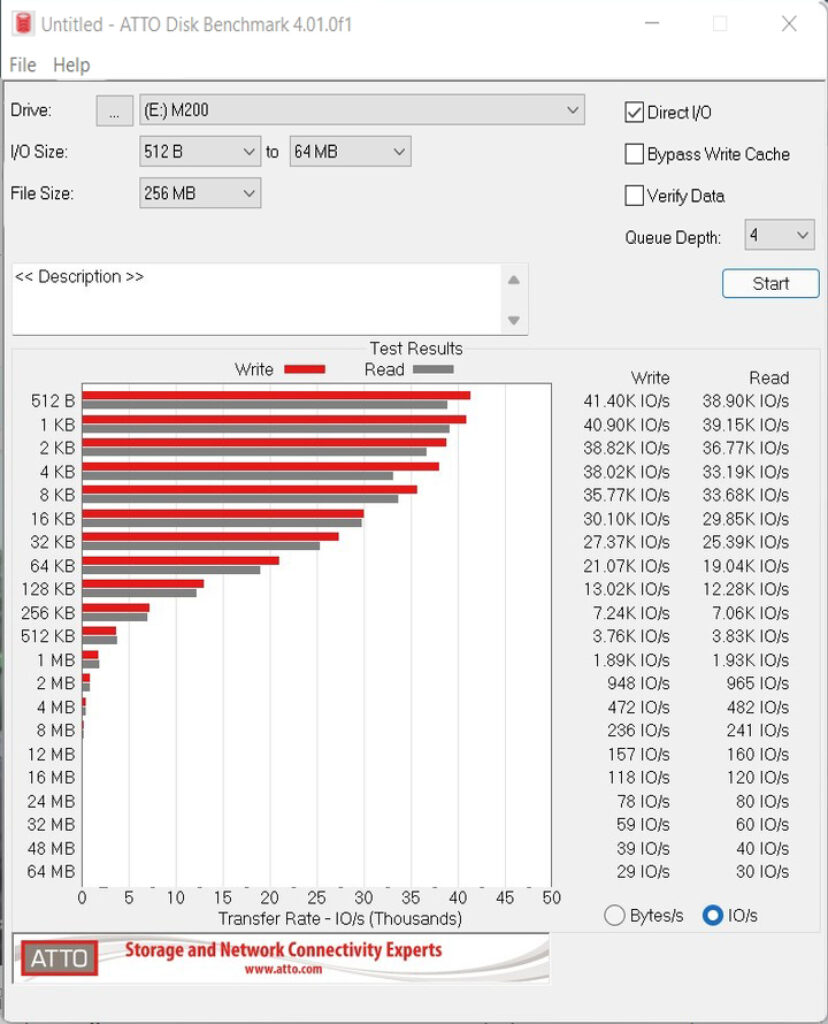
In the ATTO Disk Benchmark test, the T-FORCE M200 Portable SSD delivers impressive performance, achieving a maximum read speed of 1.87 GB/s and a write speed of 1.84 GB/s for blocks larger than 512KB. For smaller blocks, such as the 64KB size, sequential read and write speeds remain robust, reaching up to 1GB/s. When it comes to input/output operations per second, the SSD maintains high read and write rates for blocks under 8KB, with a steady improvement in performance as the block size increases.
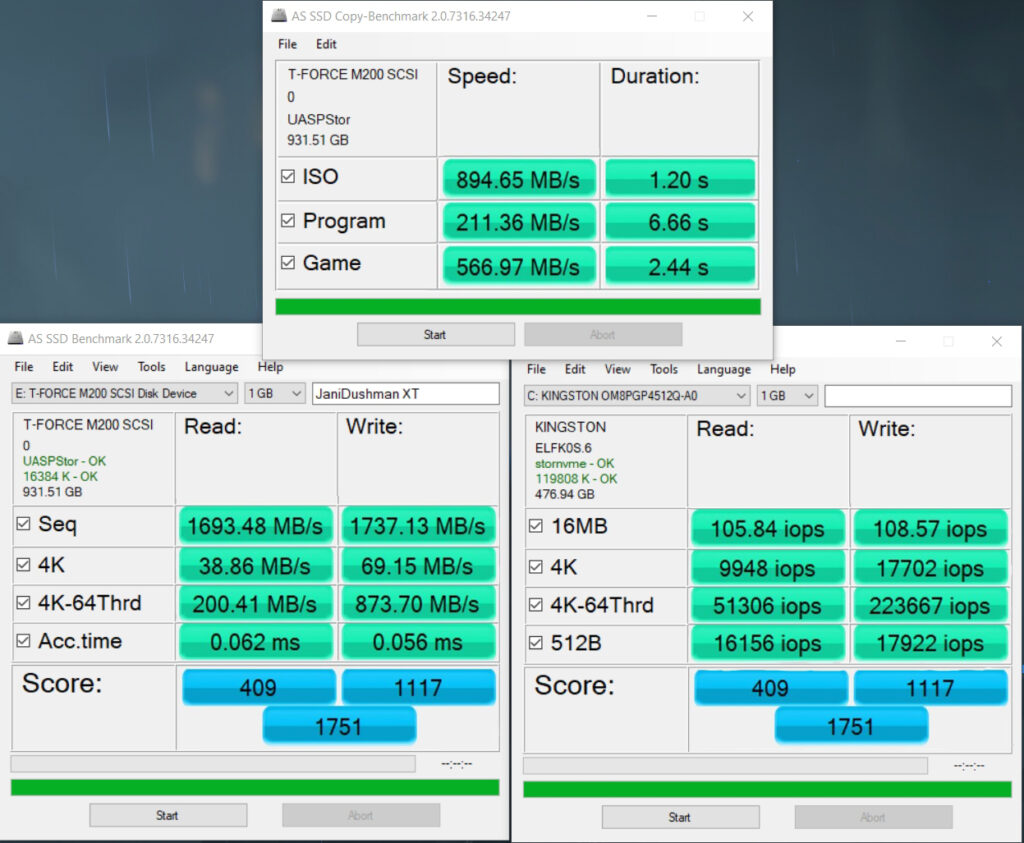
In the AS SSD Benchmark, the T-FORCE M200 Portable SSD scored a total of 1751. During the 1GB test file, the sequential read and write speeds were 1693.48 MB/s and 1737.13 MB/s, respectively. For random access I/O, the SSD achieved 51306 IOPS for reading and 223667 IOPS for writing. In the 4K 64-Thread test, the performance was about 15% faster than typical USB 3.2 Gen 2 products. In the AS SSD copy tests, the M200 reached 894.65 MB/s in the ISO copy, 211.36 MB/s in the program copy, and 566.97 MB/s in the game copy. Compared to USB 3.2 Gen 2 drives, the M200 delivered a 25% faster ISO copy speed, while the program and game copy speeds were nearly twice as fast.
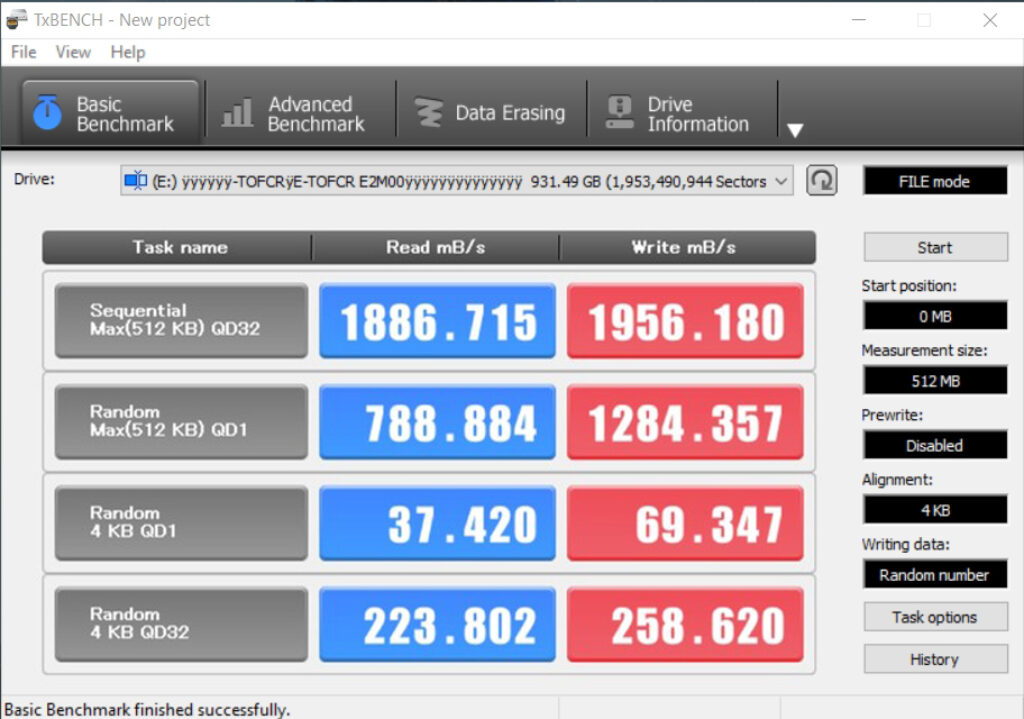
In the TxBench test, the T-FORCE M200 Portable SSD demonstrated solid performance with a sequential read speed of 1886.715 MB/s and a write speed of 1956.180 MB/s. For 4K random read and write at QD1, it recorded a read speed of 37.42 MB/s and a write speed of 1956.180 MB/s, with an input speed of 69.347 MB/s. When tested for random read and write, the SSD leveraged the high bandwidth of USB 3.2 Gen 2×2, showing a noticeable advantage without significant deviation from sequential speeds.
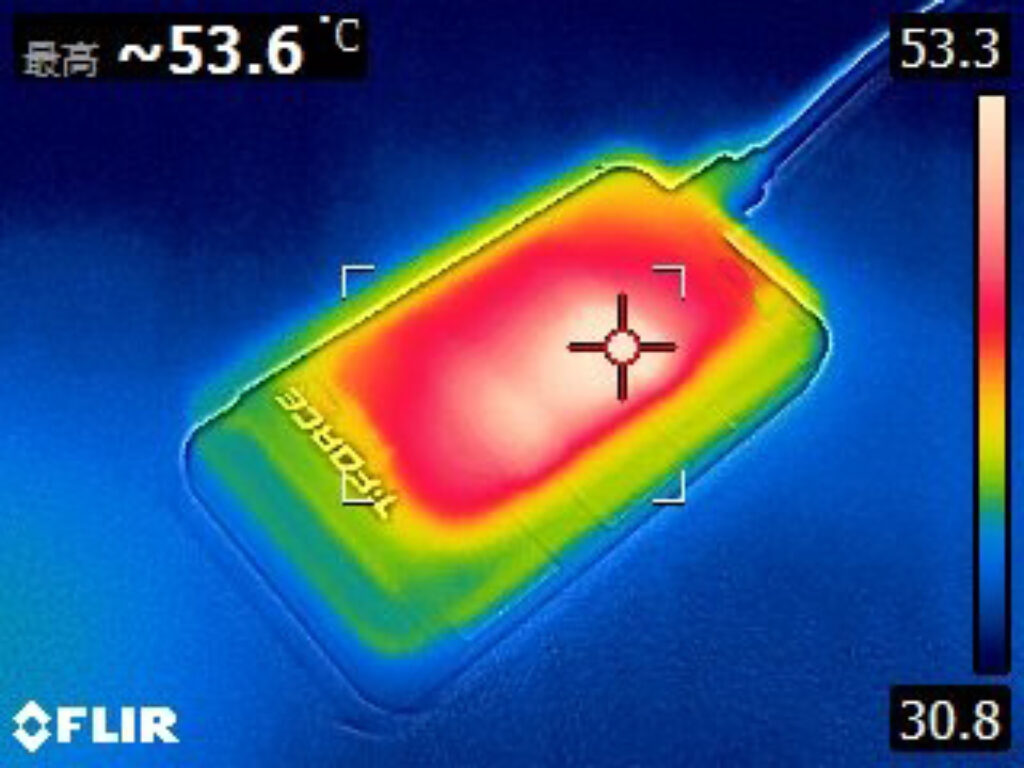
The T-FORCE M200 Portable SSD features a metal casing paired with a graphene thermal conductive sheet, designed to improve heat dissipation. However, during extended writing sessions, the surface temperature tends to rise noticeably. To monitor this, a FLIR infrared thermometer was used for precise temperature measurements throughout the testing process.







